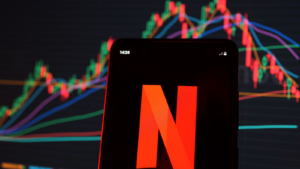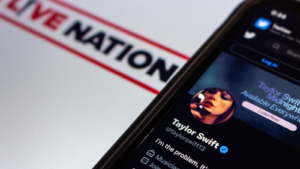Either way, consumers will start splurging on themselves once they can rebuild their savings. Whether “spaving” (spending more money to take advantage of discounts) ends up in the driver’s seat this summer as some firms backtrack on recent price increases remains to be seen.
Entertainment is becoming more of a need than a want for today’s crowd, many of whom value experiences. Here are three cheap entertainment plays that could stay hot in summer.
Netflix (NFLX)

First, we have top-tier streamer Netflix (NASDAQ:NFLX), which has a good chance of making new highs in the second half. At writing, NFLX stock is on a seemingly unstoppable run, soaring more than 57% in the past year alone. As it turned out, Netflix’s pivot towards an ad-based tier has gone quite smoothly.
Morgan Stanley (NYSE:MS) analyst Benjamin Swinburne sees more good times ahead for the top streaming platform, with a “bull case” price target of $850. Specifically, Swinburne sees a big opportunity for Netflix in the “scaling of its advertising business,”
Not only is Netflix continuing to excel at producing must-binge content regularly, but it’s also on track to build on recent momentum in its ad-based tier. Netflix knows what we want to watch. As it learns more about us, it’ll probably understand what products would also tempt us to buy.
Indeed, don’t bet against Netflix, as it’s already proven to be a high-value entertainment subscription. This is even after countless price hikes and password-sharing crackdowns. Additionally, the recent postponement of the Jake Paul vs. Mike Tyson boxing match shouldn’t be too big a deal for the coming quarter.
Live Nation (LYV)

Live Nation (NYSE:LYV) has to be one of my favorite Millennial and Gen Z plays on the market right now. The company has a pretty wide moat around its share of the “experience” market, and I don’t think any credible challengers can narrow such a moat anytime soon. As long as big-name artists continue drawing in big crowds, I simply do not see LYV stock backtracking, especially from today’s modest levels.
Lately, there have been some troubling negative headlines hitting Live Nation. From the recent Ticketmaster hack, which reportedly exposed data from 560 million users to a U.S. regulatory crackdown on Ticketmaster’s “monopolistic practices,” it certainly seems like a nail-biting time to be a shareholder.
In any case, the recent sag in the stock is more of a long-term buying opportunity for investors seeking exposure to an entertainment powerhouse. Recent setbacks could be an overhang for quite some time, but the long-term narrative remains as robust as ever. The stock is still down more than 25% from its early 2022 highs.
Royal Caribbean Cruise Lines (RCL)

Royal Caribbean Cruises (NYSE:RCL) has been a shocking outperformer this year, with RCL stock surging over 25% year to date. With a fresh new all-time high in the record books, I wouldn’t be so fast to jump ship on the name quite yet. Not as bookings continue flowing in after an imposing period of seasonal strength (so-called “wave season”). Sometimes, strength begets strength, and record breakers beget more record breakers.
Looking back, management wasn’t upbeat enough about booking demand for the coming sizzling summer travel season. While seasonality plays a major role in the cruise line plays, RCL stock is worth holding for the long haul as the premier cruise operator cuts back on debt and invests in growth initiatives.
Who knows? Perhaps next year’s booking boom may be even more pronounced as the king of cruising beckons travelers of all ages.
On the date of publication, Joey Frenette did not hold (either directly or indirectly) any positions in the securities mentioned in this article. The opinions expressed in this article are those of the writer, subject to the InvestorPlace.com Publishing Guidelines.
Joey Frenette is a seasoned investment writer specializing in technology and consumer stocks. Contributing to the Motley Fool Canada, TipRanks, and Barchart, Joey excels in spotting mispriced stocks with long-term growth potential in a fast-paced market.
